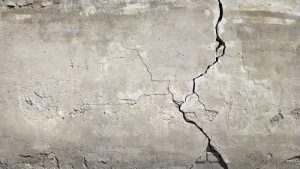While concrete is generally accepted as one of the strongest materials around for building, it isn’t invincible. Over time, concrete begins to deteriorate. Detecting concrete deterioration is a topic we’ve covered before, but why does it happen at all? There are a lot of ways concrete can age and deteriorate, but here are some of the most common causes.
Embedded Metals
When you have metal embedded in your concrete, you run the risk of corrosion causes the concrete itself to begin deteriorating. Rebar, post-tensioning cables, and steel can begin to rust inside of the concrete. It will start expanding due to the rust and thus cause cracks, spalling, and delamination in the concrete.
Freeze-Thaw Deterioration
When water freezes into ice it expands, so that means that any water that seeps into the cracks in concrete will then cause damage when it freezes. The ice can expand so much that it makes pieces of concrete actually pop right out. D-cracking, which is a type of freeze-thaw deterioration, happens when water pools in the base and subbase of pavements. It will start cracking the concrete at the base but eventually, it will reach the surface.
Watching Out For Chemicals
You may think fighting freeze-thaw deterioration with a deicer is a good idea, but chemicals can actually contribute to concrete deterioration. Deicers won’t cause damage immediately but over time they will lead to concrete corrosion. Acids are harmful to concrete since they react with calcium hydroxide and form water-soluble calcium compounds, which, once rain washes it away, will cause awful concrete corrosion.
GPR and Frequency Location Services from Concrete Visions
Concrete Visions has over 12 years of experience and expertise in concrete scanning and we know how to detect any problems lurking beneath the surface. We use ground penetrating radar accurately and expertly and are familiar with many other methods that can be used when appropriate like concrete x-ray and electromagnetic conductivity. We are also very familiar with the latest construction safety techniques and train all of our workers to do their work quickly, accurately, and safely. If you would like to learn more about how we can help you, give us a call at (410) 766-2210 or visit us online. For more articles and tips, follow us on Facebook, Twitter, LinkedIn, and Google+.

